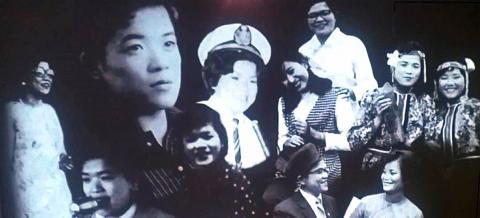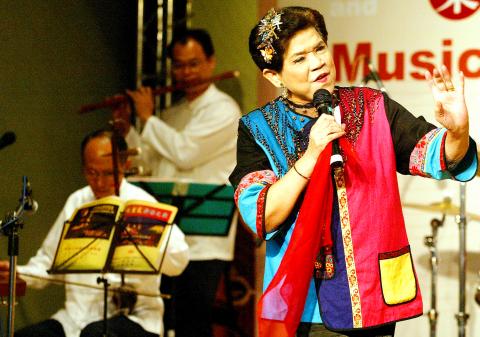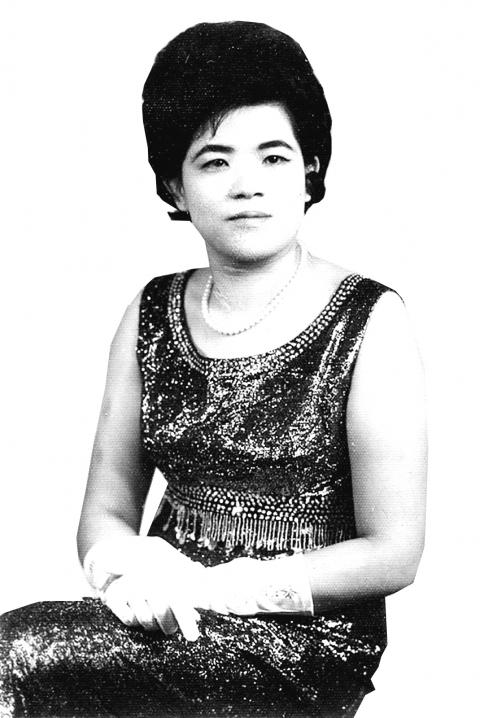Jan. 15 to Jan. 21
Lai Pi-hsia (賴碧霞) learned enough Atayal to communicate with her peers while growing up in the Aboriginal village of Chingchuan (清泉) in Hsinchu County, but she still had trouble fully understanding their songs.
One day, she heard a different tune that spoke to her in a way she could not explain. And she could understand all the words and sing along. She ran into the construction site where the voice was coming from and asked the workers what song it was. They laughed and told her it was a Hakka mountain song. With Hakka being her native tongue, Lai immediately understood why the songs sounded familiar.

Photo: Lee Jung-ping, Taipei Times
“After that, I asked about every song I heard and tried to learn from every person I encountered,” she writes in her book, Taiwan’s Hakka Mountain Songs (台灣客家山歌). She even walked across the mountains for three days to learn the art of writing lyrics from an illiterate maestro.
From then on, Lai not only dedicated her life to singing, collecting, recording, promoting and teaching Hakka mountain songs, she also wrote plenty of other material ranging from television shows to comedy performances to three-character, tea-picking dramas (三腳採茶戲), another Hakka specialty.
By the time of her death on Jan. 18, 2015, Lai had recorded more than 50 albums and had written more than 20 scripts for various productions, writes Chen Yi-chun (陳怡君) in the book Lai Pi-hsia and Her World of Hakka Folk Music (賴碧霞與她的客家民歌天地).

Photo: Wang Yi-sung, Taipei TImes
WHAT MAKES A SONG ‘MOUNTAIN’
Chen writes that Hakka mountain songs were first brought to Taiwan from China by Han Chinese settlers in the 17th century. “Singing mountain songs while picking tea” was a quintessential image of rural Hakka life as music helped alleviate the drudgery of hard labor.
“Initially, it was likely a way for people who liked to sing to entertain themselves and others up in the mountains,” Chen writes. As more Hakka settled in the Taoyuan, Hsinchu and Miaoli areas, mountain songs became a mainstream form of entertainment.

Photo courtesy of Wikimedia Commons
These songs evolved in Taiwan and became increasingly improvisational. Since they were only passed on orally, the lyrics changed with the times. Cautionary songs, ballads and playful attacks were among the themes covered. Lai adds that during Japanese rule, many songs expressed their hatred for the colonizers.
“The singers skillfully adapted the lyrics to the time, place, person and event,” Lai writes. “Other singers can also arbitrarily respond to the lyrics. That’s why Hakka mountain songs can capture people’s hearts — you can listen to the same song 100 times and not feel bored.”
Hakka mountain songs, along with other forms of Han Chinese culture, were banned during the later years of the Japanese era. They thrived again during the early days of Chinese Nationalist Party (KMT) rule, but soon loss popularity with the arrival of modern music.
PERSISTENT STUDENT
Lai was born in 1932 in today’s Jhudong (竹東) Township in Hsinchu County. Her first musical love was the Japanese songs that she heard on her uncle’s phonograph, and she was encouraged by her Japanese teacher to pursue singing.
In 1947, her father retired from Chingchuan and moved the family back to Jhudong, where there was a higher concentration of Hakka speakers. Lai wanted to learn from folk music master Kuan Lo-cheng (官羅成), but he did not accept students. A persistent Lai befriended Kuan’s wife by washing clothes with her every day by the river, and eventually she was able to persuade Kuan to teach Lai.
Kuan specialized in the melodies but not the lyrics, which led to Lai walking three days across the mountains to visit Lai Ting-han (賴庭漢). The illiterate Lai Ting-han would sing the lyrics and Lai Pi-hsia would write them down phonetically in Japanese and bring them to a Chinese teacher for translation.
Since there was not much printed material about Hakka mountain songs, Lai began actively collecting lyrics this way. By the time she was 20 years old, she had established herself in Hakka circles as a performer.
In 1954, Lai got a job as a traveling advertisement announcer, touring the country twice in two years primarily to promote Ve Wong Corp’s (味王) monosodium glutamate and Taiwan Morinaga’s (森永) milk formula. Fluent in Mandarin, Hoklo (also known as Taiwanese), Hakka, Japanese and Atayal, she was able to sing to audiences wherever she went, becoming a hot commodity in the industry. She started making records and writing her own music shortly afterward, and later worked as a host for various local radio stations, where she started penning Hakka radio dramas — several of which she acted in, produced and directed.
Her career blossomed from there, and in 1973 she wrote the screenplay for Taiwan’s first Hakka feature film, Tea Mountain Love Song (茶山情歌). She retired that same year and dedicated the rest of her life to teaching and researching Hakka mountain songs.
Lai was critical of those teachers who ignored the improvisational nature of Hakka mountain songs, calling it “singing a song to death.”
“Whenever someone’s song wins a contest, everyone will start singing that exact same song and forget the fact that it’s supposed to be improvisational. Before, I would sing one verse and the other person would respond, going back and forth for up to three days. Now it’s all gone stale.”
Lai writes about her desire to preserve Hakka folk music in her 1983 book: “Now society is filled with the decadence of Western, [Japanese and local] pop music, and the people who are interested in folk music are often not Hakka so they do not understand the nuances in the rhyming and phrases with double meanings. That’s why I will make available all that I’ve learned.”
Taiwan in Time, a column about Taiwan’s history that is published every Sunday, spotlights important or interesting events around the nation that have anniversaries this week.

William Liu (劉家君) moved to Kaohsiung from Nantou to live with his boyfriend Reg Hong (洪嘉佑). “In Nantou, people do not support gay rights at all and never even talk about it. Living here made me optimistic and made me realize how much I can express myself,” Liu tells the Taipei Times. Hong and his friend Cony Hsieh (謝昀希) are both active in several LGBT groups and organizations in Kaohsiung. They were among the people behind the city’s 16th Pride event in November last year, which gathered over 35,000 people. Along with others, they clearly see Kaohsiung as the nexus of LGBT rights.

Dissident artist Ai Weiwei’s (艾未未) famous return to the People’s Republic of China (PRC) has been overshadowed by the astonishing news of the latest arrests of senior military figures for “corruption,” but it is an interesting piece of news in its own right, though more for what Ai does not understand than for what he does. Ai simply lacks the reflective understanding that the loneliness and isolation he imagines are “European” are simply the joys of life as an expat. That goes both ways: “I love Taiwan!” say many still wet-behind-the-ears expats here, not realizing what they love is being an

In the American west, “it is said, water flows upwards towards money,” wrote Marc Reisner in one of the most compelling books on public policy ever written, Cadillac Desert. As Americans failed to overcome the West’s water scarcity with hard work and private capital, the Federal government came to the rescue. As Reisner describes: “the American West quietly became the first and most durable example of the modern welfare state.” In Taiwan, the money toward which water flows upwards is the high tech industry, particularly the chip powerhouse Taiwan Semiconductor Manufacturing Co (TSMC, 台積電). Typically articles on TSMC’s water demand

Every now and then, even hardcore hikers like to sleep in, leave the heavy gear at home and just enjoy a relaxed half-day stroll in the mountains: no cold, no steep uphills, no pressure to walk a certain distance in a day. In the winter, the mild climate and lower elevations of the forests in Taiwan’s far south offer a number of easy escapes like this. A prime example is the river above Mudan Reservoir (牡丹水庫): with shallow water, gentle current, abundant wildlife and a complete lack of tourists, this walk is accessible to nearly everyone but still feels quite remote.